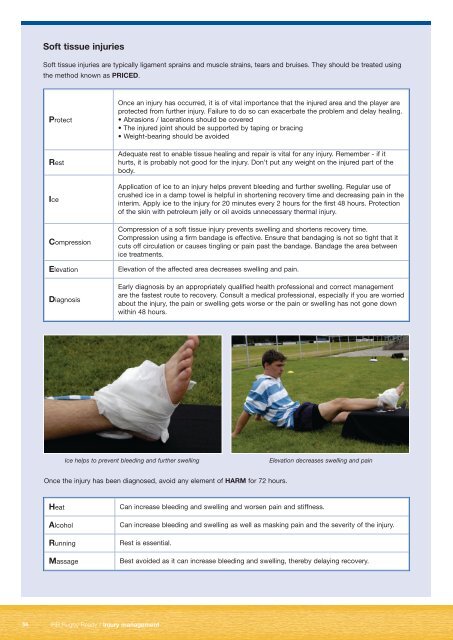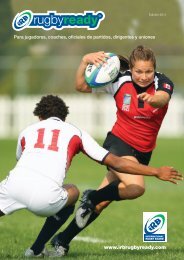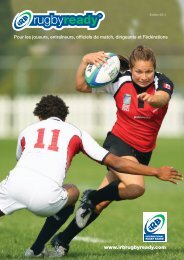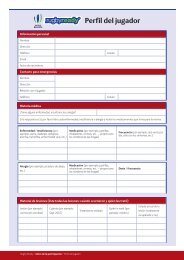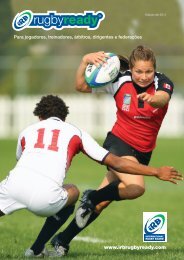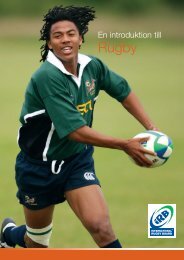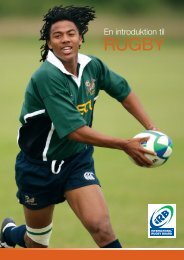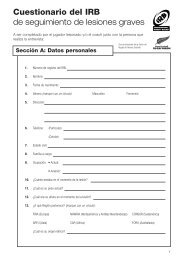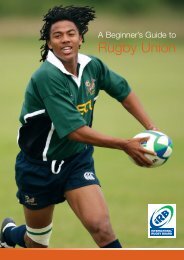IRB Beginner's Guide to Rugby - IRB Rugby Ready
IRB Beginner's Guide to Rugby - IRB Rugby Ready
IRB Beginner's Guide to Rugby - IRB Rugby Ready
You also want an ePaper? Increase the reach of your titles
YUMPU automatically turns print PDFs into web optimized ePapers that Google loves.
Soft tissue injuries<br />
Soft tissue injuries are typically ligament sprains and muscle strains, tears and bruises. They should be treated using<br />
the method known as PRICED.<br />
Protect<br />
Rest<br />
Ice<br />
Compression<br />
Elevation<br />
Diagnosis<br />
Once an injury has occurred, it is of vital importance that the injured area and the player are<br />
protected from further injury. Failure <strong>to</strong> do so can exacerbate the problem and delay healing.<br />
• Abrasions / lacerations should be covered<br />
• The injured joint should be supported by taping or bracing<br />
• Weight-bearing should be avoided<br />
Adequate rest <strong>to</strong> enable tissue healing and repair is vital for any injury. Remember - if it<br />
hurts, it is probably not good for the injury. Don’t put any weight on the injured part of the<br />
body.<br />
Application of ice <strong>to</strong> an injury helps prevent bleeding and further swelling. Regular use of<br />
crushed ice in a damp <strong>to</strong>wel is helpful in shortening recovery time and decreasing pain in the<br />
interim. Apply ice <strong>to</strong> the injury for 20 minutes every 2 hours for the first 48 hours. Protection<br />
of the skin with petroleum jelly or oil avoids unnecessary thermal injury.<br />
Compression of a soft tissue injury prevents swelling and shortens recovery time.<br />
Compression using a firm bandage is effective. Ensure that bandaging is not so tight that it<br />
cuts off circulation or causes tingling or pain past the bandage. Bandage the area between<br />
ice treatments.<br />
Elevation of the affected area decreases swelling and pain.<br />
Early diagnosis by an appropriately qualified health professional and correct management<br />
are the fastest route <strong>to</strong> recovery. Consult a medical professional, especially if you are worried<br />
about the injury, the pain or swelling gets worse or the pain or swelling has not gone down<br />
within 48 hours.<br />
Ice helps <strong>to</strong> prevent bleeding and further swelling<br />
Elevation decreases swelling and pain<br />
Once the injury has been diagnosed, avoid any element of HARM for 72 hours.<br />
Heat<br />
Alcohol<br />
Running<br />
Massage<br />
Can increase bleeding and swelling and worsen pain and stiffness.<br />
Can increase bleeding and swelling as well as masking pain and the severity of the injury.<br />
Rest is essential.<br />
Best avoided as it can increase bleeding and swelling, thereby delaying recovery.<br />
56<br />
<strong>IRB</strong> <strong>Rugby</strong> <strong>Ready</strong> / Injury management


